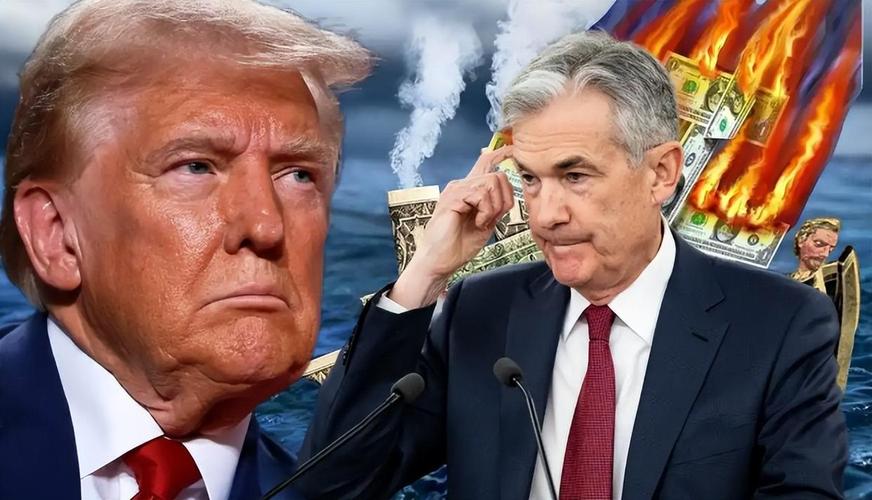
In the current context where the global economy is closely intertwined, any change in the economic policies of the United States is likely to cause a huge stir. Recently, the news that Trump plans to remove Powell from his position has been like a huge rock thrown into the financial market, causing a huge stir and drawing global attention.
On July 16th, a major piece of news shocked the financial world: Trump has drafted a letter to fire Federal Reserve Chair Powell. This news instantly caused a heavy blow to the US stock market and the US dollar, with a collective plunge. Meanwhile, spot gold rose sharply, and the market's risk aversion sentiment rose sharply. Although Trump later denied it, saying that he "has no intention of doing anything", he still left a vague space of "not ruling out any possibility", which kept the market still in a state of panic.
The conflict between Trump and Powell has a long history. Since Trump returned to the White House, he has frequently pressured the Federal Reserve to cut interest rates, hoping to stimulate economic growth through low interest rates and achieve a series of his economic and political goals. He believes that the US government is burdened with huge debt interest, and the current benchmark interest rate of around 4.3% of the Federal Reserve is too high and should be reduced to no more than 3%. However, under Powell's leadership, the Federal Reserve adhered to the principle of "independent operation" and repeatedly refused to conform to the policy orientation of the White House in public. Powell emphasized that adjustments to monetary policy should be made with caution and a thorough assessment of the impact of tariffs on inflation and the future economic trend. This huge ideological divergence has made Trump's dissatisfaction with Powell grow day by day.
In terms of style, Powell is low-key and conservative, and rarely participates in media and public opinion. This is contrary to Trump's expectation that officials in key positions will actively cooperate with his public statements. In addition, Treasury Secretary Scott Bessent and Director of the National Economic Council Kevin Hassett, among others in Trump's economic team, generally criticized Powell, further intensifying the conflict between the two.
If Trump's move comes true, the consequences would be unimaginable. From a legal perspective, the Supreme Court of the United States ruled on May 22 that officials of the Federal Reserve cannot be dismissed due to policy differences. This means that if Trump forcibly fires Powell, it may trigger a legal and constitutional crisis. In the financial market, investors attach great importance to the independence of the Federal Reserve. Once Powell is dismissed, it will greatly undermine market confidence.
If Powell is dismissed, the US dollar and US Treasuries may experience a sell-off. As the world's major reserve currency, the credit of the US dollar largely depends on the independence of the Federal Reserve. Once independence is undermined, investors' confidence in the US dollar will waver, funds will flow out of the United States, the dollar will depreciate, the yield of US Treasury bonds will rise, and the financing cost of the US government will increase significantly. For the US stock market, it may experience a sharp decline in the short term due to market panic. In the long term, economic uncertainty has increased, business investment and consumer confidence have been undermined, economic growth has slowed down, and the stock market is also unlikely to perform well.
Several US banking leaders in charge of huge assets have made rare public statements, emphasizing that defending the independence of the Federal Reserve is crucial to the economic and financial stability of the United States. This is sufficient to show the severity of the impact of this incident.
Although Trump has temporarily denied the dismissal plan for now, the conflict between him and Powell has not been resolved. In the future, Trump may continue to intensify his public opinion offensive and put pressure on Powell. The White House may also accelerate the selection process for the chairperson of the Federal Reserve and make early preparations. If Powell insists on completing the remaining term, the relationship between the two sides may reach a stalemate, and the operation of the Federal Reserve will also face huge pressure. Even Congress may intervene in the discussion of the independence of the Federal Reserve, triggering new political disputes.
This "Trump vs. Powell" dispute is no longer merely a conflict between the two; it also concerns the direction of the US economy, the stability of the financial market, and the development of the global economy. All parties are closely following the subsequent development of the incident, expecting the United States to handle it properly and avoid triggering global economic turmoil.

On January 4th local time, Trump warned India that if it does not limit its purchase of Russian oil, the United States will continue to raise tariffs on Indian products. Trump's latest warning sent shockwaves through the Indian financial market in just one day.
On January 4th local time, Trump warned India that if it do…
In October 2025, the US trade deficit narrowed unexpectedly…
According to the British media CoinJournal, recently, due t…
In January 2026, US President Trump once again set his sigh…
Europe is facing a crucial strategic choice: In the face of…
On New Year's Day 2026, BMW China announced a "systematic v…